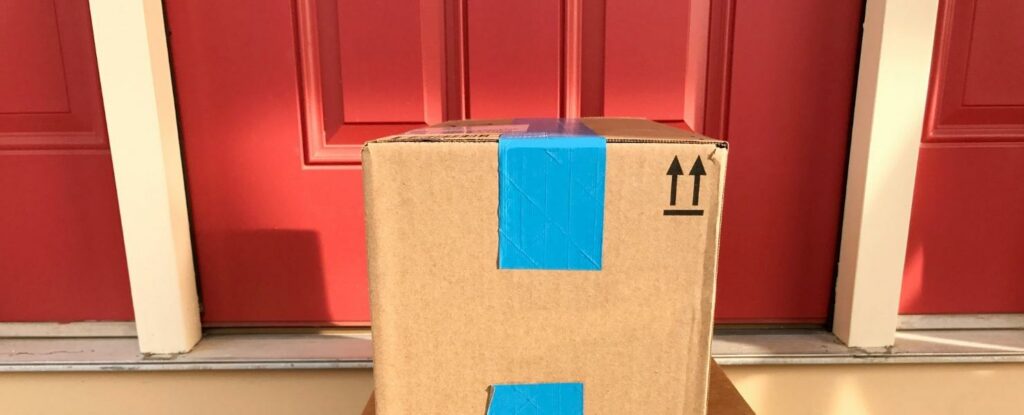They say the best things in life are free — love, get-togethers with family and friends, and smiles are just a few examples. Free dinners and T-shirts aren’t bad, either. So, if you are suddenly getting free packages on your doorstep, it may be a welcome sight… but it also may be a brushing scam.
How did someone know you needed a new hairdryer and toenail clippers? Except the box didn’t come from a friend or family member who knew you had an eye on making a few upgrades to your vanity. In fact, there’s no return address, gift receipt, or card.
We hate to break it to you, but it may be a scam. And the item may not be free exactly — the sender may have ulterior motives.
When people receive free packages with items they never ordered, they may inadvertently be a part of what’s known as a brushing scam. Let’s discuss what that means, whether it’s dangerous, and what you can do if it happens to you.
What’s a Brushing Scam?

Brushing scams involve someone sending you a package with an unordered product. Sometimes, the box is actually empty.
The latter may be confusing and a bit of a bummer. But a package with a free item may be confusing, but exciting. However, the Federal Trade Commission warned people to beware of brushing scams, and they made headlines in 2020 when people mysteriously began receiving unordered seeds in the mail.
Why? Because there’s a caveat. The person sending you free stuff isn’t doing so out of the goodness of their heart. They’re really a third-party seller who is fishing for compliments or, more specifically, fake reviews on online marketplaces like Amazon or eBay.
To get a review that appears legitimate, the scammer needs the marketplace to think an actual transaction happened. That’s where you come in. By sending you an item, the scammer has created a tracking number. Once the delivery person drops the item off at your door or in your mailbox, someone can write a “verified” review.
Are Brushing Scams Harmful?

Getting free stuff is fun, especially if it’s something you like. And are a few false reviews really that bad since there are probably some genuinely legitimate ones to balance things out?
Brushing scams may not seem as bad as romance scams, which can cost people their entire life savings. Technically, sending someone an unsolicited item isn’t illegal, though Amazon and eBay ban sellers from doing that, and the FTC has gone after marketers for fake reviews for years.
But brushing scams aren’t harmless either. People rely on reviews to make purchases. Conversion marketing company Invesp says 9 in 10 customers say online reviews are as important as personal recommendations. And a report from Northwestern’s Spiegel Research Center found that a customer is 270 percent more likely to buy a product with five reviews than one with no reviews.
Positive reviews can lead to better business for a company — which is why sellers resort to brushing scams. But potential customers get duped in the process and may waste their precious dollars and cents on a product that doesn’t deserve the glowing reviews a seller paid people to write.
It also increases their sales numbers, which can also up their credibility with potential customers.
Though you may think it’s only one or two fraudulent reviews, a savvy seller could be generating several times that through brushing scams.
Brushing scams aren’t typically harmless to the recipient of the unsolicited product, though if you didn’t really want the item, it might be annoying. It also means someone somehow got your name, home address, and maybe even your phone and credit card numbers, which can be unsettling. The United States Postal Inspection Service says that sometimes, the bad actor will have a porch pirate steal the item before it gets to you, meaning yet another person has your home address.
What to do About Brushing Scams

Accepting unsolicited gifts isn’t legal. If you like the item, you’re welcome to keep it. And since there likely isn’t a return address, the best thing to do if you don’t like the item is to donate it, throw it away, or “regift it.”
But there are also some steps to take to out the seller and do your part to squash brushing scams, which in turn helps other consumers make purchases based on honest reviews.
- Contact the retailer. Sending unordered products isn’t against the law, but it does go against many retailers’ policies. If you received something you did not order, let the marketplace, like Amazon or eBay, know. They can investigate the situation and potentially ban the seller from the site for violating their policies.
- Don’t pay for the product. You didn’t ask for it, so you have no obligation to pay for the product. If someone contacts you asking you to pay for it, refuse and contact the local authorities.
- Update your passwords. If you receive an unwanted package, someone has your personal information. It’s possible, though not a guarantee, that your account may have been compromised. It will be tough to tell, so your best bet is to change your password on the website to be safe. WayWiser recommends avoiding weak or obvious passwords, like password123, and using the same one for every site. Using a combination of numbers, symbols, capital, and lowercase letters can strengthen your password.
- Monitor your accounts. Since your personal information may have been compromised, you’ll want to keep an eye on your credit cards and bank accounts to ensure the bad actors didn’t steal and start making purchases using your credit or debit card.
- Return to sender. Though brushing scammers often don’t include a return address, some do. If that’s the case, you can mark the package “return to sender.” And the United States Postal Service will send it back at no charge to you.
- Notify authorities. If the contents of the package seem suspicious, such as an unknown liquid or powder, contact the authorities so they can investigate further and ensure you are kept safe.
- Report the scam to the FTC. Notifying the retailer is important, but you’ll also want to flag the issue with the FTC, particularly if it’s recurring. The FTC’s website contains information on how to report fraudulent activity.







